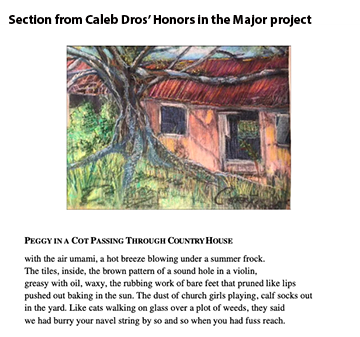Honors in the Major Program—Caleb Dros
Caleb Dros graduated with a degree in English from Florida State University in May 2020. In addition to completing an Honors in the Major (HITM) project, he won the 2020 Department of English Steven D. Schloff Undergraduate Creative Writing Award for Fiction. Dros also was honorable mention for the John Mackay Shaw Academy of American Poets Undergraduate Award and first runner-up for the Cody Harris Allen Award for Outstanding Undergraduate Writing.
The HITM Program allows any FSU student who has completed 60 hours of coursework and has a 3.2 GPA or higher to participate. The student must complete a research thesis or a creative project in their area of study under the supervision of a committee composed of at least three faculty members.
Read on for more information about Dros and his project.
Major
English, Creative writing, with a minor in hospitality
Hometown
Philipsburg, Sint Maarten. (Dutch Caribbean
Title of Honors In The Major project
Tobacco/Sand
See Caleb's project here.
Faculty advisor
English Professor David Kirby
What was the inspiration behind your HITM project?
Tobacco/Sand is a poetry collection. I tend to travel between cities on my off time here in America. I thought of the Tobacco/Sand title when I took a trip to Nashville one summer. I had realized how much being in America for such a long time had changed my tastes and personality over time. At one point, I was entirely a Caribbean person, but mobile enough to be in this space to straddle the line between cultures. Tobacco/Sand is an exploration of that hybrid or ambiguity of identity. It’s a reclamation of authenticity to the culture I belong, while being incredibly mobile across cultures.
Tobacco/Sand is an exploration of that hybrid or ambiguity of identity. It’s a reclamation of authenticity to the culture I belong, while being incredibly mobile across cultures.
I used to be ashamed of that idea of being in between. When I’m back home it’s easy for people to see “mister big college America”; when I’m in the U.S. it’s easy for people to see “coconut ice-cream fisherman Caribbean guy.” I’m neither. The title is split into a Tobacco/Sand binary because it reminds me of the beaches back home—I love the smell of cigarettes and sand. It becomes this coarse, powdery stuff that’s neither purely organic or soot. It’s got bottle caps, red ants, a chicken bone, and some old cigarette buds. That sense of neither or, or mixture, is Tobacco/Sand. It’s me. And Tobacco/Sand is a reclamation in that sense.
Explain the context and conclusion of your HITM project.
While it wasn’t a research project, I learnt a lot about self-discipline in my alone time when writing this project. I read a lot, wrote a lot, and I tried to write freely. The main point of the project was me learning that there is no “Caribbean aesthetic” for me—the binary of Tobacco/Sand doesn’t exist for me. That was the trick behind the title. It also doesn’t assume that its absence implies a white American default. I learnt that my writing is uniquely Caleb Dros over any tokenized value. I learnt to trust myself in my writing a bit more.
Describe your working relationship with Professor Kirby; how did he help guide you through the process?
I visited Dr. Kirby quite a bit during my thesis. He’s helped me with quite a bit, but I mostly appreciate how open he is to just sit down and talk about poetry ideas for any length of time. Kirby introduced me to the Honors program, and also told me (a long time ago) about the student awards in the English department. He also was my poetry professor for Advanced Workshop. I think a good professor is someone who doesn’t have an obligation to you, but they choose to work and interact with you in meaningful ways regardless. He didn’t do it because he had to, he did it because he wanted to. His office is always open, and we often exchanged e-mails in order to critique my poems and the order of my thesis. He worked as a guide to give me the OK for what I was doing.
What advice would you give to any English students who want to apply for HITM?
Keep an open mind. I met a lot of people with new ideas that I had never even heard of. They were all wildly interesting. Not everyone is a creative writing major, so you get a really good blend of people with incredible ideas from different disciplines. Even with my fellow poet peers, I saw ideas that I’ve never really heard of. It’s a great place to get in touch with what feels like the undergrad’s “cutting edge.”
On top of that, honors courses introduced me to concepts I would have never come across in my daily life. Sometimes, it was a steep learning curve. I’d also say try to keep up with your project—self-guided work is hard to procrastinate on. For me, my thesis was the time for me to pull out all the stops and start experimenting with styles I had never tried before. My advice would be to take advantage of that experimental phase of your thesis.
What plans do you have post-graduation?
I’ll be starting FSU’s Master of Fine Arts program for creative writing. While the COVID-19 pandemic wasn’t the way I thought I’d be starting, I’ll be spinning my wheels on some new ideas that I’ve wanted to do. I think my MFA experience will help sharpen my skills to where I’d like them to be.

